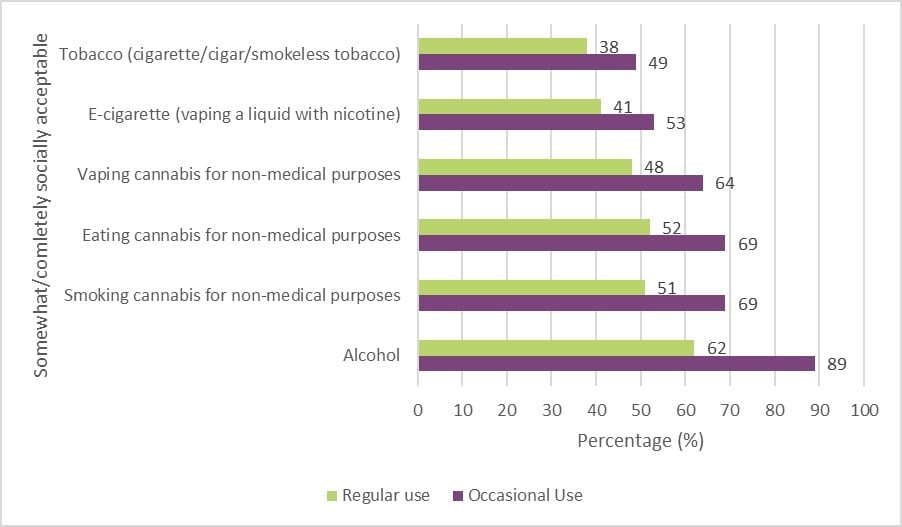The ABCs of CBD: How to Start an Edibles Business in Canada

The legalization of cannabis in Canada has opened up a world of opportunities for entrepreneurs looking to enter the burgeoning edibles market. With the increasing demand for cannabis-infused food and beverages, starting an edibles business can be a lucrative venture for those with a passion for culinary creativity and a keen eye for industry trends.
In this article, we will guide you through the essential steps to starting an edibles business in Canada, from understanding the legal framework and obtaining the necessary licenses to developing your product line and building your brand.
Let’s dive in and explore the fascinating world of cannabis-infused edibles!
1. Overview of the Cannabis Edibles Market in Canada
The cannabis edibles market in Canada has shown a robust expansion since the legalization of cannabis for recreational use in October 2018. As you seek to start an edibles business in Canada, it’s essential to understand the landscape of this sector.
Market Size & Growth: Canadian recreational cannabis sales were worth 5.07 billion Canadian dollars ($3.8 billion) in 2023, an increase of 12.2% compared to 2022, according to government retail sales data. This growth signifies a thriving sector, where edibles play a significant role.
Consumer Preferences: Canadians are showing an increasing interest in cannabis edibles for their discretion and variety. The market includes diverse products such as chocolates, gummies, baked goods, and beverages. You’ll find that customer preferences lean towards innovative and convenient forms, expanding beyond the traditional smokers’ market.

Regulatory Environment: Health Canada regulates the cannabis industry, including edibles, to ensure safety and compliance. Your business will need to navigate these regulations, which cover aspects like packaging, THC limits, and marketing. Staying informed on the legal framework is crucial for the successful operation of your edibles business.
Competitive Landscape: The market is evolving, with numerous players and a level of competition that encourages quality and innovation. Your competitive edge may come from product uniqueness, quality ingredients, or brand positioning.
Entering the cannabis edibles market in Canada means tapping into a growing and dynamic industry. With consumer interest at an all-time high and a clear set of regulations, you have a foundation on which to build a successful edibles venture.
2. Licensing and Legal Requirements
Canada’s edibles market operates under stringent regulations. You should be aware that provinces have specific guidelines, such as in Ontario, where the sale of cannabis is permitted through private retail and the Ontario Cannabis Store. Familiarize yourself with the federal Cannabis Act as well as local laws to ensure you start on solid legal ground.
Obtaining a Cannabis License
To launch your edibles venture, you must first secure a cannabis license. The process involves several thousand dollars in application fees and, once approved, an annual fee for license renewal which usually ranges from just under $1,000 to $3,000. Connect with the provincial or territorial licensing body to start your application. For example, in Ontario, selling recreational cannabis requires a Retail Operator Licence from AGCO.
Compliance with Health Canada’s Regulations
Aligning with Health Canada’s regulations is non-negotiable. Since passed in October 2018, the Cannabis Act allows for legal production and sale of edibles; however, it demands compliance with stringent safety and packaging standards.
Packaging and Labeling Requirements
Packaging and labeling are tightly regulated to ensure safety and informed consumption. Your packages must be child-resistant, and your labels should include mandatory health warnings, THC content, and a standardized cannabis symbol. This is critical to comply with Health Canada’s Packaging and labelling guide for cannabis products and keep consumers safe.
THC Limits and Dosage Restrictions
Canada enforces strict THC limits to control consumption and mitigate health risks. According to cannabis regulations, edibles are capped at 10 mg of THC per package. Be precise with your dosing to meet these restrictions and provide consistent product quality to your customers.
Health and Safety Standards
High health and safety standards safeguard not only your consumers but also your business’s reputation. Implementing Good Production Practices is essential. This includes cleanliness protocols, employee hygiene, and product testing to prevent contamination and ensure product integrity.
Local Zoning and Bylaws
Finally, you must consider local zoning and bylaws which dictate where you can physically operate your business. These laws vary widely, so check with your municipal office to ensure your desired location complies with local regulations. It’s essential to do this early to avoid any zoning surprises that could derail your business plans.
3. Business Planning and Strategy
Creating a comprehensive business plan and implementing a robust strategy are critical components for the success of your edibles business. Focus on detailed planning and understanding your market to stand out in this growing industry.
Creating a Business Plan
Your journey begins with crafting a thorough business plan. This document is your roadmap, outlining your business objectives, proposed products, financial details, and the structure of your company. Be specific about your business model, revenue streams, and operational plans.
Market Analysis and Target Audience
In-depth market analysis is crucial to identify your potential customers and understand the competitive landscape. Evaluate trends and demands within the industry to effectively pinpoint your target audience. Use this data to tailor your products and marketing efforts to meet the specific needs and preferences of your customers.
Branding and Product Differentiation
Establishing a strong brand and differentiating your products is vital in a crowded marketplace. Your brand’s identity should resonate with your target audience and reflect the unique qualities of your edibles. Consider quality ingredients, innovative flavors, and unique packaging designs to set your offerings apart from competitors.
4. Production and Product Development
To start an edible cannabis business, it is essential that you pay close attention to production and product development, focusing on sourcing quality ingredients and adhering to strict manufacturing standards to ensure the safety and consistency of your products.
Sourcing Quality Ingredients
The quality of your edibles starts with the ingredients. You will need to secure a reliable supply of high-quality cannabis, which must be purchased from a licensed producer. For other ingredients, choose suppliers who provide top-grade products that comply with Canadian food safety regulations.
Manufacturing Facilities
Your manufacturing facility must meet Health Canada’s stringent regulations. This includes investments in commercial-grade kitchen appliances and ensuring the environment is suitable for food production. Regular inspections will be conducted to verify that your facilities adhere to the necessary cleanliness and safety standards.
Product Testing and Quality Control
Quality control is paramount. You need to establish a robust testing protocol that includes both the potency and purity of your products. These tests will help to maintain a consistent dosage across batches and ensure there are no harmful contaminants, such as pesticide active ingredients, in your products.
5. Financial Considerations
Managing your finances wisely is crucial in starting a successful edibles business. You’ll need to pay close attention to startup costs, ensure you have a solid plan for budgeting and cash flow, and setting your price points competitively.
Startup Costs and Financing
Your initial investment will cover various aspects of your business setup. This can include the cost of licensing for your cannabis business, which in some regions can reach several thousand dollars. You’ll also need capital for equipment, ingredients, and perhaps a commercial space. To secure financing, you can explore options like business loans, investors, or crowdfunding.
Budgeting and Cash Flow Management
Maintaining a healthy cash flow is critical for your edibles business. You should have a budget in place that accounts for both variable and fixed costs. It’s also important to track your expenses and revenues closely to ensure you can cover the costs of ongoing operations and avoid running out of cash.
- Fixed Costs: Rent, utilities, salaries
- Variable Costs: Ingredients, packaging
- Revenue Tracking: Keep meticulous records
Setting Price Points
When pricing your edibles, consider your production costs, the competitive landscape, and your desired profit margin. Your prices should reflect the value and quality of your products, but also ensure they are accessible to your target market. Use a pricing strategy that aligns with your business goals.
- Calculate Cost per Unit: Include all production costs
- Market Research: Understand competitor pricing
- Pricing Strategies: Consider value-based or tiered pricing models
6. Marketing and Sales Strategies
Successful marketing and sales strategies are essential for the growth of your edibles business. Your approach should include a strong online presence, efficient retail and distribution channels, and a focus on engaging and retaining customers.
Building an Online Presence
In today’s digital age, having an online presence is a crucial step in marketing your edibles business. Start by creating a professional website featuring your brand and product line. Ensure the site is SEO-optimized to rank higher on search engines. Use social media to connect with your audience, posting engaging content that highlights the uniqueness of your edibles and educates consumers about their benefits.
Retail and Distribution Channels
Expanding your retail and distribution channels can significantly boost sales. Partner with local dispensaries and consider applying to have your products at cannabis retail stores. Looking into online sales through platforms permitted by provincial regulations can also widen your market reach. Compliance with local laws is key, so make sure you’re up to date on the latest regulations.
Customer Engagement and Retention
Customer engagement is more than just making a sale; it’s about creating an ongoing relationship. Start a loyalty program to reward repeat customers and gather feedback to improve your products. Engaging with your customers through email newsletters, promotional events, and social media can help maintain interest in your brand. Remember, a satisfied customer is likely to spread the word about your delicious edibles.
Frequently Asked Questions
Here are common queries that can help set the foundation for your venture.
Resources for Starting an Edible Business in Canada
Government Resources
Industry Resources
Other Resources
About the author
Maurice